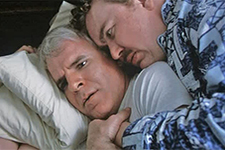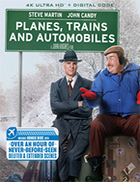Planes, Trains & Automobiles (4K UHD)
|  John Hughes’s Planes, Trains & Automobiles is a road comedy about two men trying desperately to get home for Thanksgiving and having every obstacle imaginable thrown in their way. The men are played, in a feat of pitch-perfect casting, by Steve Martin and John Candy as complete opposites who, at the beginning of the film, don’t know each other, but by the end have found that they have more in common than they thought. Martin plays Neal Page, a fastidious, neatly dressed, anal-retentive advertising executive. Candy is Del Griffith, a large, overstuffed, overbearing shower-curtain ring salesman (“Director of Sales, Shower Curtain Ring Division,” as he puts it) whose cheap blue parka and large travel trunk provide a stark contrast to Neal’s stylish gray trench coat and leather hanging bag. But, their obvious class differences are just the surface. Neal and Del’s approaches to life are miles apart, and the clash between those approaches reveals how each is flawed in its own way: Neal is too reserved and intolerant, while Del is too boisterous and eager-to-please. When they admit at the end of the movie that they are “a little wiser” from their experiences together, it is a genuine moment of truth telling. Planes, Trains & Automobiles is primarily a comedy, a travel farce about how anything that can go wrong will go wrong, regardless of the mode of transportation (hence, the title). Yet, the reason it worked so well when first released in 1987 and the reason it continues to work well is that Hughes invested his ill-matched protagonists with real human emotions and foibles. Neal and Del are character types to be sure, but the way they are written and played within the broad parameters of those types makes them endearing and unique. Martin and Candy both play to their strengths, and each delivers one of the best comedic performances of his career (Candy’s is especially good, and its lack of attention during awards season is prime evidence of how comedic acting is rarely recognized by the Oscars). Hughes, who was, at the time, known primarily for writing and directing effective and smart teen dramedies like Sixteen Candles (1984), The Breakfast Club (1985), and Ferris Bueller’s Day Off (1986), is astute at mixing comedy and drama. There are moments of absolute hilarity scattered throughout, including the infamous sequence in which Neal and Del end up having to share a double bed in a cheap motel in Wichita, Kansas, and they wake up in the morning curled together (their bickering throughout the movie is consistently reminiscent of an old married couple) and discover that Del’s hand is not, as he thinks at first, “between two pillows.” The best scene, however (which is also the one most responsible for the film’s R-rating), involves Neal, fed up beyond control, unleashing an F-bomb-laced diatribe to a chirpy rental car agent (Edie McClurg) after the company deserts him in their vast parking lot without a rental car. It is a powerful and hilarious moment of catharsis. Yet, it has bittersweet and honestly dramatic moments, as well. In another movie, these scenes might feel forced, but because Martin and Candy ensure that Neal and Del are three-dimensional human characters of flesh and blood, they work. Take, for example, the moment in the Wichita hotel room when Martin becomes so fed up with Del’s irritating traits and habits (using up all the towels in the bathroom, spilling beer on the bed, smoking in the room, clearing his sinuses in the middle of night) that he snaps and lets Del know exactly what he thinks of him and his boring anecdotes. “Didn’t you get a clue when I started reading the vomit bag?” he exclaims. The scene works in a number of ways that set up our understanding of the characters for the rest of the movie. Del is visibly hurt by Neal’s rant, and Candy perfectly delivers a short, concise reply that shows how he understands his own shortcomings, but is still a proud man with respect for himself. At the same time, the scene forces Neal to realize his own snobbery, and the fact that he doesn’t leave tells us a great deal about his capacity, though not often realized, for empathy and understanding. Interestingly, in another movie this might be the dramatic climax, but Hughes chooses to stage the meltdown/confrontation early on, which allows it to hang in the back of our minds and frame the ensuing comedy and drama. Thus, even when the story begins to reach moments of high absurdity, it still keeps a toe on the ground because of the characters. Hughes manages to heap every imaginable indignity on his intrepid travelers over two days: They are stuck in the back of a pickup truck in sub-zero temperatures; their train breaks down and they have to hike a mile and a half to the highway; they’re stuck on a bus in which a couple is all but having sex in the seat next to them; they go the wrong way down the highway, narrowly avoiding death in the form of two oncoming 18-wheelers, only to have their car then catch on fire. The humor comes not only from the outrageous nature of these situations, but in the unexpected ways in which Neal and Deal react to them and each other. So, despite a relatively brief running time of 92 minutes, by the final moments we feel like we really know these characters. The final scenes are somewhat melodramatic, but it’s hard not to be affected by them because Hughes and his actors have earned the tears. To have ended the movie on a comic note would have undermined all the work they had done to make Neal and Del memorable people, rather than just character types. Planes, Trains & Automobiles is certainly funny, but it is also a moving story that anyone who has ever recognized his or her own shortcomings will understand.
Copyright © 2022 James Kendrick Thoughts? E-mail James Kendrick All images copyright © Paramount Home Entertainment | |||||||||||||||||||||||||||||
Overall Rating: 


 (3.5)
(3.5)


